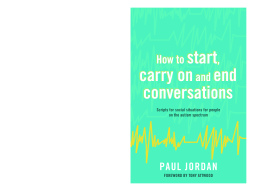
Additional Information
Book Details
Abstract
Do you find it hard to make friends? Do you struggle to know what to say to start a conversation?
In this book, Paul Jordan, who is on the autism spectrum, explains how to make sense of everyday social situations you might encounter at school, university or in other group settings. He reveals how, with the use of just 65 simple words, it is possible to create 'scripts for thinking' that break conversations down into small chunks and help you to think of what to say, whether you are speaking to a fellow student, starting a conversation with a new friend, calling out bullies or answering a teacher's question.
These small words will be a big help for all teenagers and young people with ASD.
[The author] has developed a simple strategy for facilitating conversation that can greatly enhance the quality of life of someone who has Asperger's syndrome. The art of conversation can be learned and achieved, and this valuable book explains how.
From the foreword by Professor Tony Attwood PhD, Brisbane, Australia
Paul Jordan, BA, Grad Dip., Master of Translation, Australian National University, has Asperger's Syndrome. When he was at school, he experienced similar problems to other young people with Autism Spectrum Disorder (ASD), but he wasn't formally diagnosed until he turned 25. As an adult, he has made it his mission to try to help others with ASD, particularly those between 12 and 16 years old, who are going through the same difficulties he did at school. Paul lives in Canberra, Australia.
Table of Contents
| Section Title | Page | Action | Price |
|---|---|---|---|
| How to Start, Carry On and End Conversations: Scripts for social situations for people on the autism spectrum by Paul Jordan, with Elizabeth Manning Murphy DE and Professor Anna Wierzbicka | 3 | ||
| Foreword by Tony Attwood PhD | 7 | ||
| Acknowledgments | 9 | ||
| Introduction | 13 | ||
| Chapter 1 - Bullying | 19 | ||
| Chapter 2 - Making friends | 33 | ||
| Chapter 3 - Managingconversations | 43 | ||
| Chapter 4 - Special interests | 53 | ||
| Chapter 5 - Thinking differently can be a problem | 69 | ||
| References | 83 | ||
| Index | 85 | ||
| Blank Page |
